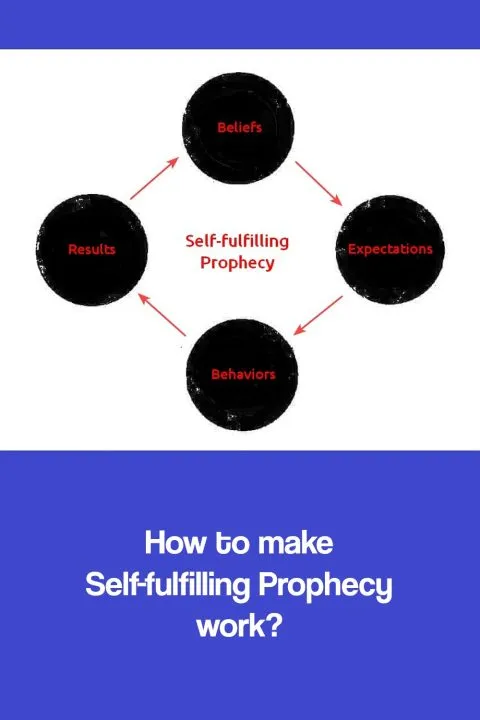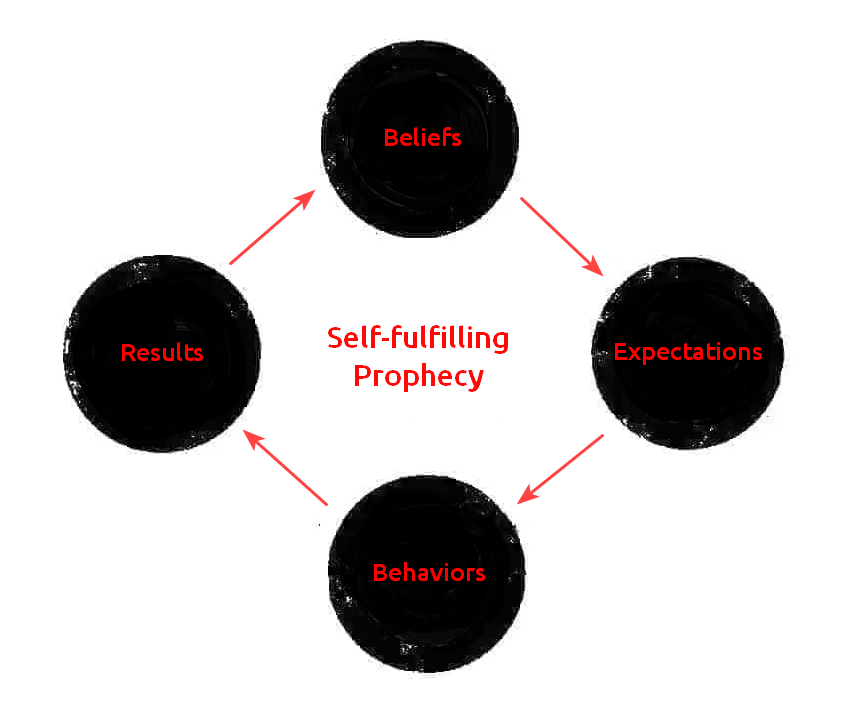Reading time: 6 minutes
You’ve probably heard the sayings “You become what you think” or “Thoughts become things.”But is there any real science behind this idea? The answer lies in the self-fulfilling prophecy.
Self-fulfilling prophecy (SFP) happens when your beliefs and expectations influence your behavior in a way that makes those beliefs come true.
For example, if you believe you’re going to fail a test, you might not study as hard. And because you didn’t prepare properly, you end up performing poorly, fulfilling your initial negative expectations.
Of course, SFP can be positive or negative. Optimistic beliefs lead to positive outcomes, while pessimistic beliefs tend to become self-sabotaging.
How to make a self-fulfilling prophecy work?
The self-fulfilling prophecy is a powerful mind-body phenomenon to actively design your reality from the inside out.
- You get the ball rolling when you choose an optimistic perspective.
- Combine it with empowering habits to increase the chances that your thoughts will become the things that shape your life.
SFP is a cycle or a loop. It starts with your beliefs and expectations, works its way to unconscious behaviors, and ends up shaping your reality.

So, how can you use this mind trick to your advantage? Here are 4 tips:
1. Set up empowering micro-habits
Build a routine of small, motivating actions. Try setting a fixed routine of micro-habits. Like doing 1 squat every hour at your desk, making the first 3 sips of your coffee a fully mindful experience, writing yourself 6 words of motivation every night. These will accumulate to boost your mental and physical stamina.
2. Practice positive self-talk
Notice your negative thoughts, and ask your mind to stop. (You can even say “Stop!” to yourself). Then reframe them with positive affirmations. Think about who you want to be, with a sharp focus on your strengths. Gradually, it will reshape your beliefs and expectations about yourself and the world around you.
3. Surround yourself with positive people
Spend time with people who encourage and believe in you. They can keep you motivated, bounce your ideas, help you course-correct, and connect you with supportive people.
4. Set achievable goals
Having step-by-step goals builds your confidence in your ability to make things happen. Setting achievable yet stretch goals that you can accomplish so that it increases your chances of success.
Limitations of the Self-Fulfilling Prophecy
The practical truth is that self-fulfilling doesn’t always work as much as we want. It cannot give unlimited and surefire ways to realize your dreams and goals.
Some of its limitations are:
- Not always accurate: Our beliefs and expectations are not always accurate and can be influenced by biases, stereotypes, and other factors.
- Not the only factor: Our beliefs and expectations are not the only factors that influence our experiences and results. Other factors, such as luck, environment, and external circumstances, also play a role.
- Does not work equally for all: The same self-fulfilling prophecy can yield different results in different people. It happens because each of us has different obstacles and facilitators in our lives, at least mentally if not physically too.
Manifestations of the Self-Fulfilling Prophecy
The self-fulfilling prophecy is a mind-bending phenomenon where your beliefs can literally shape your reality. It plays out in all kinds of everyday situations:
Education
Students who believe they’re smart and capable tend to do better academically. But those who doubt their abilities often struggle, confirming their own negative expectations.
Relationships
People who feel worthy of love and respect usually attract healthy partnerships. But those who see themselves as unlovable tend to end up in toxic relationships that prove their belief.
Career
Employees who are confident about their skills and potential typically get promoted faster. Those who don’t believe in themselves often stay stuck, living down to their own low expectations.
In each case, the self-fulfilling prophecy turned out to be a powerful cycle of thoughts becoming things.

History of the Self-Fulfilling Prophecy
The idea of self-fulfilling prophecies dates back centuries, but it was first named in the 1940s by sociologist Robert Merton. He defined it as a “false belief that leads to its own reality.”
For example, let’s say a math student convinces themselves they’re terrible at algebra based on a few poor test scores. That negative belief makes them dread algebra and stop trying, which then causes them to fail more algebra tests — making the original false belief become reality.
Merton’s ideas were built on the work of philosopher Georg Hegel in the 1800s. Hegel had shared how one person’s expectations can shape their relationship with someone else, creating a self-fulfilling “master-slave” dynamic.
So if your beliefs are to manifest into your experiences, you have to start seeding your mindset with optimism and a can-do attitude. Your thoughts are that powerful.
What is the Self-Fulfilling Prophecy?
Have you ever worried so much about failing a test that you didn’t prepare properly and ended up doing poorly? Or convinced yourself you’d never be good at a sport, so you gave up trying and never got better?
That’s the self-fulfilling prophecy in action. It’s a psychological phenomenon where your beliefs and expectations directly influence your reality.
It works like this:
- A person has a certain mindset about a situation, whether that’s a negative assumption (“I’m terrible at algebra”) or a positive one (“I can ace this audition if I practice”).
- The student who thinks they’re bad at algebra doesn’t put in much effort studying. The aspiring performer who believes in themselves works hard to prepare.
- The algebra student fails their test, confirming their negative belief. The diligent performer nails the audition, proving their self-confidence was justified.
So, your thoughts then shape your behavior. And then, your behavior leads to the outcome you originally expected.
Final Words
While the idea of self-fulfilling prophecies can seem supernatural, it’s really just mind over matter.
Your thoughts influence your conscious choices and unconscious habits in a way that directly shapes your circumstances. Negative expectations can become self-sabotaging. Positive expectations can lead to real achievement.
The key is being pragmatic — while still being realistic. Positive thinking alone won’t make you a math genius. But if you combine a hopeful mindset with diligent effort, it can dramatically improve your potential.
So, take control of your beliefs and expectations, and you are on your way to manifest remarkable personal growth and achievement.
What future will you envision for yourself?
√ Also Read: The Power of Belief: Psychology of Self-Fulfilling Prophecy
√ Please spread the word if you found this helpful.
• Our Story!
